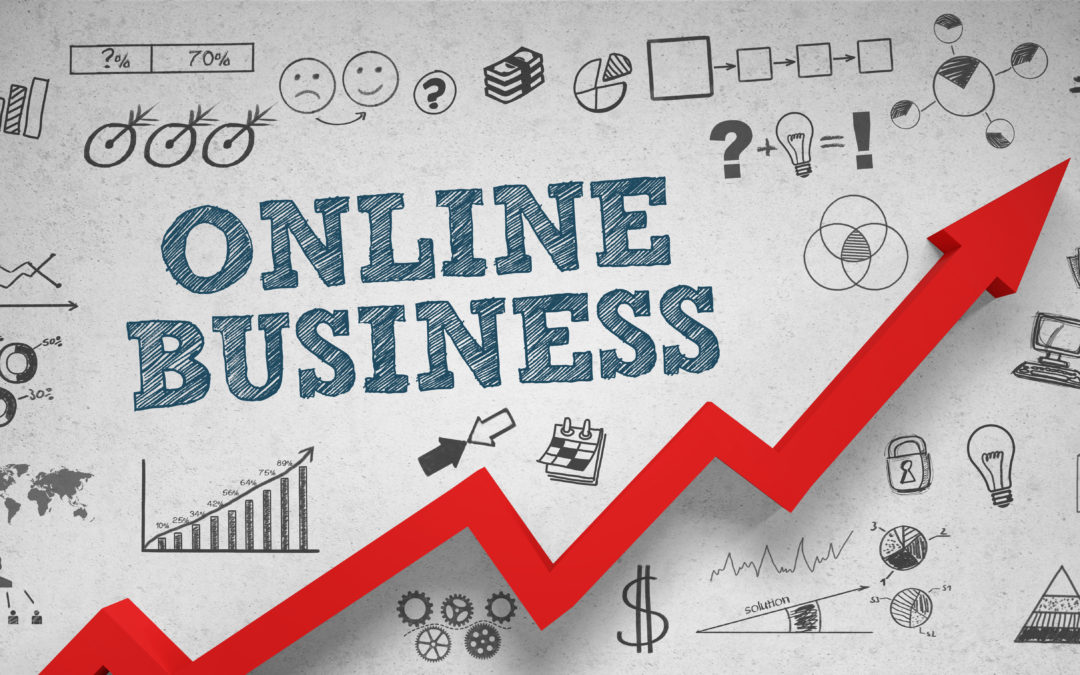An online business operates through the internet, offering goods or services to a global audience. It leverages digital platforms for marketing and sales. Establishing a strong Online Business Strategies is crucial for success.
Starting an online business provides flexibility and access to a vast customer base. Entrepreneurs can choose from various models, such as e-commerce, affiliate marketing, or digital products. Establishing a strong Online Business Strategies is crucial for success. This involves creating a user-friendly website, optimizing for search engines, and engaging on social media platforms.
Consistent and quality content attracts and retains customers. Investing in digital marketing strategies, like SEO and PPC, can significantly boost visibility and sales. With low startup costs and the ability to operate from anywhere, an online business is an attractive venture for many aspiring entrepreneurs.

Credit: contiguglia.com
The Digital Marketplace Evolution
The digital marketplace has changed how we shop and do business. Online businesses offer many products and services. This shift has been swift and transformative. More people now prefer to shop online.
Shift From Brick-and-mortar To Click-and-order
Physical stores were the primary shopping places. Now, the internet hosts countless e-commerce platforms. This shift has been gradual but impactful. Brick-and-mortar stores are evolving or closing. More brands are going digital.
Online stores offer convenience. Customers can shop from their homes. They also have a wider variety of products. Prices are often competitive. Here is a comparison:
| Aspect | Brick-and-Mortar | Click-and-Order |
|---|---|---|
| Convenience | Limited | High |
| Product Variety | Moderate | Extensive |
| Pricing | Often Higher | Competitive |
Emerging Trends Shaping Online Businesses
Several trends are shaping the future of online businesses. These trends are making the digital marketplace more dynamic.
- Mobile Commerce: More people use smartphones to shop. Mobile-friendly websites are crucial.
- Social Media Shopping: Social platforms are now shopping hubs. People buy directly from these platforms.
- Personalization: Online stores offer personalized experiences. They use data to customize products and services.
- Sustainability: Eco-friendly practices are gaining popularity. Consumers prefer sustainable products.
- Subscription Models: Subscription boxes are trending. Businesses offer products on a regular basis.
These trends are essential for online business success. They help in attracting and retaining customers. Businesses need to adapt to stay relevant.
Identifying Your Niche
Starting an online business can be exciting and rewarding. The first step is to identify your niche. A niche helps you focus on a specific market segment. It allows you to tailor your products and services. This section will guide you through the process of identifying your niche.
Research And Competition Analysis
Conducting thorough research is essential. It helps you understand the market. You need to know who your competitors are. Here are some steps to follow:
- Use online tools to gather data on market trends.
- Analyze your competitors’ strengths and weaknesses.
- Identify gaps in the market that you can fill.
Look at the following table to understand the key points:
| Step | Description |
|---|---|
| Market Trends | Use tools like Google Trends to see what’s popular. |
| Competitor Analysis | Study your competitors’ websites and offerings. |
| Market Gaps | Identify areas where competitors are lacking. |
Target Audience Profiling
Knowing your target audience is crucial. You need to understand their needs and preferences. Here’s how you can profile your target audience:
- Identify their demographics (age, gender, location).
- Understand their interests and behaviors.
- Find out their pain points and needs.
Creating a customer persona can help. This persona represents your ideal customer. It includes details about their lifestyle and preferences. See the example below:
| Customer Persona |
|---|
| Age: 25-35 years |
| Gender: Female |
| Location: Urban areas |
| Interests: Health and Fitness |
| Pain Points: Lack of time for exercise |
Building A Robust Online Presence
Building a robust online presence is crucial for any online business. It ensures visibility, trust, and engagement with potential customers. A strong online presence helps attract and retain customers. Let’s explore some key strategies to achieve this.
Creating A User-friendly Website
A user-friendly website is essential. It should be easy to navigate and visually appealing. Visitors should find information quickly. Here are some tips:
- Use a clean layout with clear headings.
- Ensure fast loading times.
- Optimize for mobile devices.
- Provide easy-to-find contact information.
An intuitive design keeps visitors longer and reduces bounce rates. Consider using a simple color scheme and readable fonts. High-quality images and videos can enhance user experience. Regularly update your content to keep it fresh and relevant.
| Feature | Importance |
|---|---|
| Navigation | High |
| Loading Speed | High |
| Mobile Optimization | High |
Leveraging Social Media Platforms
Social media platforms are powerful tools for reaching a wider audience. Each platform has its unique strengths. Here are some key points:
- Facebook: Great for community building and advertising.
- Instagram: Ideal for visual content and brand storytelling.
- Twitter: Useful for real-time updates and customer engagement.
- LinkedIn: Best for professional networking and B2B marketing.
Consistency is key. Post regularly and engage with your followers. Use hashtags strategically to increase visibility. Paid advertising on social media can also boost your reach.
Monitor your social media analytics. Understanding what works will help you refine your strategy.

Credit: www.elegantthemes.com
Search Engine Optimization (seo) Tactics
Search Engine Optimization (SEO) is crucial for any online business. It helps your website rank higher on search engines. This increases visibility and drives more traffic to your site. Let’s dive into some essential SEO tactics.
Keyword Research And Content Creation
Effective keyword research is the foundation of successful SEO. Use tools like Google Keyword Planner or Ahrefs. Find keywords that your target audience searches for. Focus on long-tail keywords as they have less competition.
Once you have your keywords, create engaging content. Your content should provide value and answer questions. Use your primary keywords naturally within the text. Don’t overuse them. This is called keyword stuffing and it can hurt your ranking.
Include keywords in your titles, headings, and meta descriptions. This helps search engines understand your content better. Also, use images and videos to make your content more engaging. Optimize these media files with alt text that includes your keywords.
On-page And Off-page Seo Strategies
On-Page SEO involves optimizing individual pages on your website. Ensure your titles and headings are clear and include keywords. Use internal links to guide users to other pages on your site. This helps search engines crawl your site more effectively.
Another aspect of on-page SEO is your site’s loading speed. A faster site keeps visitors engaged and reduces bounce rates. Use tools like Google Page Speed Insights to check your site’s performance.
For off-page SEO, focus on building quality backlinks. Backlinks are links from other websites to your site. They show search engines that your site is credible. Guest posting on reputable blogs can help you gain these backlinks. Also, engage with your audience on social media. Social signals can boost your SEO efforts.
Harnessing The Power Of Content Marketing
Content marketing is crucial for online businesses. It helps build trust, engage audiences, and boost sales. By creating valuable content, businesses can attract and retain customers.
Blogging And Article Writing
Blogging is a powerful tool in content marketing. It allows businesses to share valuable insights and engage with their audience. Here are some benefits of blogging:
- Boosts SEO: Blogs improve search engine rankings.
- Builds Authority: High-quality articles establish expertise.
- Engages Audience: Blogs encourage reader interaction.
Writing articles also provides numerous benefits. It helps in generating leads and building brand awareness. Consistent, high-quality content keeps readers coming back for more. Use the following strategies to enhance your articles:
- Use catchy headlines.
- Include relevant keywords.
- Add visuals for better engagement.
- Keep paragraphs short and concise.
Video Content And Podcasting
Video content is engaging and highly effective. It captures attention and delivers information quickly. Businesses can use videos to showcase products, share tutorials, or provide customer testimonials. Here are some benefits of video content:
- Increases Engagement: Videos hold viewer attention longer.
- Boosts Conversion Rates: Videos can lead to higher sales.
- Enhances SEO: Videos improve search engine visibility.
Podcasting is another powerful content marketing tool. It allows businesses to share valuable information through audio content. Podcasts are convenient for listeners and can be consumed on the go. Benefits of podcasting include:
- Builds a Loyal Audience: Regular podcasts create dedicated listeners.
- Expands Reach: Podcasts can reach a global audience.
- Establishes Authority: Expert interviews and discussions boost credibility.
Combining video content and podcasting can create a comprehensive content strategy. This approach caters to different audience preferences and maximizes reach.
Leveraging Data Analytics
Data analytics can transform your online business. It helps you understand your customers better. You can make informed decisions. Let’s dive into how you can leverage data analytics.
Understanding Customer Behavior
Understanding customer behavior is crucial. It tells you what your customers like and dislike. You can see patterns in their actions. Analyze the data to find these patterns.
Use tools like Google Analytics. Track which pages get the most visits. See how long customers stay on each page. This data is valuable. It helps you know what interests your customers.
Utilizing Metrics To Drive Strategy
Metrics are key to driving strategy. Track important numbers. These numbers guide your decisions. Here are some essential metrics:
| Metric | Description |
|---|---|
| Conversion Rate | Percentage of visitors who make a purchase. |
| Bounce Rate | Percentage of visitors who leave after viewing one page. |
| Customer Lifetime Value (CLV) | Total revenue expected from a customer over their lifetime. |
Use these metrics to refine your strategy. Focus on areas that need improvement. Aim to enhance the customer experience. This will boost your overall performance.
Social Media Strategies For Customer Engagement
Engaging customers through social media is crucial for online businesses. Effective strategies can boost customer loyalty and drive sales. This section explores key strategies for customer engagement on social platforms.
Building Brand Loyalty On Social Platforms
Building brand loyalty on social media requires consistent interaction. Post regularly to keep your audience engaged. Share valuable content that resonates with your followers. Use a mix of informative, entertaining, and promotional posts.
- Respond to comments and messages promptly.
- Host live sessions to connect with your audience.
- Create polls and surveys to gather feedback.
Reward loyal followers with exclusive offers. This encourages repeat business and strengthens the bond with your brand.
Influencer Partnerships And Collaborations
Collaborating with influencers can amplify your reach. Choose influencers whose audience aligns with your target market. Their endorsement can build trust and attract new customers.
| Steps | Details |
|---|---|
| 1. Identify | Find influencers relevant to your niche. |
| 2. Outreach | Contact them with a clear proposal. |
| 3. Collaborate | Work together on content creation. |
Track the performance of influencer campaigns. Measure metrics like engagement and sales. This helps you understand the impact and refine future strategies.
Online Advertising And Marketing Campaigns
Online advertising and marketing campaigns are crucial for any online business. They help you reach a larger audience and generate more leads. Effective campaigns can significantly boost your sales and brand awareness. Let’s dive into some of the most effective strategies.
Pay-per-click (ppc) Advertising
PPC advertising allows you to pay only when someone clicks your ad. This method is cost-effective and offers immediate results. You can use platforms like Google Ads and Bing Ads for PPC campaigns.
- Keyword Research: Find keywords relevant to your business.
- Ad Copy: Write engaging and clear ad text.
- Budget Management: Set a daily or monthly budget.
- Landing Pages: Ensure your landing pages are optimized.
Here’s a quick table to understand the benefits of PPC:
| Benefit | Description |
|---|---|
| Immediate Traffic | Get visitors as soon as your ad is live. |
| Targeted Audience | Reach people looking for what you offer. |
| Measurable Results | Track your ad performance easily. |
Email Marketing Techniques
Email marketing remains one of the most effective strategies. It helps in building a direct relationship with your audience. Here are some techniques to make your email marketing successful.
- Personalization: Use the recipient’s name in the email.
- Segmentation: Divide your email list based on behavior.
- Compelling Subject Lines: Write catchy subject lines.
- Call to Action: Include clear call-to-action buttons.
- Mobile Optimization: Ensure your emails are mobile-friendly.
By using these techniques, you can improve your email open rates. This leads to higher engagement and more conversions.
E-commerce Optimization
E-commerce optimization is essential for success in online business. A well-optimized e-commerce site attracts more visitors and converts them into customers. This section will focus on enhancing the shopping experience and ensuring secure payment gateways and checkout processes.
Enhancing The Shopping Experience
A seamless shopping experience keeps customers coming back. Here are some key aspects to focus on:
- Fast Loading Times: Pages should load in under three seconds.
- Mobile-Friendly Design: Ensure your site works on all devices.
- User-Friendly Navigation: Make it easy to find products.
- High-Quality Images: Use clear and detailed product photos.
- Customer Reviews: Show reviews to build trust.
Secure Payment Gateways And Checkout Processes
Security is crucial in e-commerce. Customers need to feel safe when making transactions. Here are some best practices:
- SSL Certificates: Encrypt data to protect customer information.
- Trusted Payment Gateways: Use reliable services like PayPal, Stripe, or Square.
- Transparent Policies: Clearly display return and refund policies.
- Guest Checkout: Allow purchases without creating an account.
- Multi-Layer Security: Implement two-factor authentication and fraud detection.
A secure and smooth checkout process increases conversion rates. Pay special attention to every detail to ensure a positive customer experience.
Customer Support In The Digital Age
Customer support is crucial for online businesses. In the digital age, it’s even more important. Customers expect quick and efficient help. Meeting these expectations can make or break your business.
Chatbots And Ai Support
Chatbots and AI support are game-changers. They handle simple questions quickly. This helps customers get answers fast. They also free up human agents for complex issues.
Chatbots can work 24/7. This means customers get help anytime. AI can also learn from past interactions. This makes them smarter over time.
| Feature | Benefit |
|---|---|
| 24/7 Availability | Helps customers anytime |
| Quick Responses | Reduces wait time |
| Learning Ability | Improves over time |
Maintaining A Responsive Support System
Having a responsive support system is key. Customers want quick replies. A slow response can lead to frustration.
Use multiple channels to assist customers. These include:
- Live Chat
- Social Media
Train your support team well. They need to understand your products and services. This helps them assist customers better.
Track your support performance. Use metrics like:
- Response Time
- Resolution Time
- Customer Satisfaction
These metrics help you improve your support system. Always aim for better customer experiences.
Cybersecurity Measures For Online Businesses
Online businesses face many threats in today’s digital world. Cybersecurity is crucial to protect sensitive data and maintain customer trust. This section covers essential cybersecurity measures for online businesses.
Protecting Against Data Breaches
Data breaches can harm any online business. They can lead to significant financial losses and damage reputation. Below are some effective measures to protect against data breaches:
- Regular Software Updates: Ensure all software is up-to-date to prevent vulnerabilities.
- Strong Password Policies: Use complex passwords and change them regularly.
- Data Encryption: Encrypt sensitive data both in transit and at rest.
- Access Controls: Limit access to sensitive information based on roles.
Implementing Secure Network Protocols
Secure network protocols are vital for safe online transactions and communications. They help safeguard data from unauthorized access. Consider the following secure network protocols:
- SSL/TLS: Secure Sockets Layer (SSL) and Transport Layer Security (TLS) encrypt data during transmission.
- VPN: Virtual Private Networks (VPNs) provide secure remote access to the network.
- Firewalls: Firewalls monitor and control incoming and outgoing network traffic.
- Intrusion Detection Systems (IDS): IDS detect and respond to suspicious activities.
| Measure | Purpose |
|---|---|
| Regular Software Updates | Prevent vulnerabilities |
| Strong Password Policies | Enhance security |
| Data Encryption | Protect sensitive data |
| Access Controls | Restrict data access |
| SSL/TLS | Encrypt data transmission |
| VPN | Secure remote access |
| Firewalls | Monitor network traffic |
| Intrusion Detection Systems | Detect suspicious activities |

Credit: www.forbes.com
Evaluating And Adapting Business Models
Evaluating and adapting business models is crucial for online businesses. This ensures long-term success and sustainability. By regularly assessing performance and making necessary adjustments, businesses can stay competitive.
A/b Testing For Website And Campaigns
A/B testing is a powerful tool for optimization. It involves comparing two versions of a web page or campaign to see which performs better. This helps in understanding user preferences and improving engagement.
- Identify the element to test (e.g., headline, call-to-action).
- Create two versions: Version A (original) and Version B (variation).
- Direct equal traffic to both versions.
- Analyze performance based on predefined metrics.
- Implement the version with better results.
Regular A/B testing helps in fine-tuning user experience. It also enhances conversion rates.
Pivoting Online Business Strategies Based On Market Feedback
Market feedback is invaluable for business growth. Listening to customers helps in understanding their needs and preferences. This information can be used to pivot strategies effectively.
| Feedback Type | Action |
|---|---|
| Customer Complaints | Identify common issues and address them promptly. |
| Feature Requests | Consider adding requested features to enhance product value. |
| Market Trends | Stay updated with trends and adapt offerings accordingly. |
Pivoting strategies based on feedback helps in staying relevant. It also ensures that the business meets customer expectations.
Frequently Asked Questions
What Business Is Best For Online?
E-commerce, digital marketing, and online tutoring are top online business ideas. They offer scalability and low startup costs.
What Is The Fastest Online Business To Make Money?
Dropshipping is the fastest online business to make money. You sell products without holding inventory. Profits come from price differences. It requires minimal upfront investment.
Can You Start An Online Business With No Money?
Yes, you can start an online business with no money. Utilize free platforms and social media for marketing. Focus on providing valuable content and services.
How To Start A Business Online?
To start an online business, identify your niche, create a business plan, build a website, and market your products. Utilize social media and SEO to drive traffic. Secure payment gateways for transactions.
Conclusion
Starting an online business offers immense opportunities. With the right strategies, you can achieve success and growth. Focus on providing value, engaging with your audience, and continually adapting. Remember, persistence and innovation are key. Embrace the digital landscape and turn your entrepreneurial dreams into reality.
Happy online business journey!


